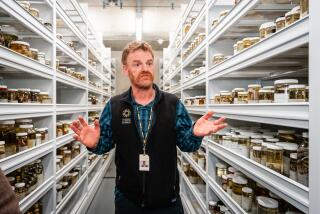A Cure With a Problem
- Share via
An American pharmaceutical manufacturer has donated its new “miracle” discovery of a cure for river blindness. Distribution, coordinated by the World Health Organization, is expected to begin before the end of the year.
The only risk to speedy distribution is the fact that WHO has been crippled by the failure of the United States to pay $87.6 million in assessments due last year and this year. This has forced the U.N. agency to cut back its primary health-care programs. If full funding is restored, there is hope that the disease can be eradicated by the year 2000, according to Dr. Halfdan Mahler, WHO director general.
Merck & Co. has developed a simple and safe drug that kills within human beings the parasite responsible for the dreaded onchocerciasis. The disease is endemic in West Africa, the Sudan and Yemen, as well as in areas of six Latin American nations. The drug is called Mectizan, a derivative of ivermectin, used since 1981 to kill parasites in animals. An annual dosage of one or two pills is all that is required for human treatment, thus simplifying the problem of distribution in isolated areas.
Because most victims of the disease are impoverished and their governments lack substantial resources, Merck has chosen to make the drug available without charge. WHO officials and a number of congressional leaders have praised the generosity of the company. The praise is appropriate. The research, not including the manufacturing costs, represents a gift measured in millions of dollars. The importance is great. In West Africa alone, 326,000 people have been blinded by the disease and 17 million are currently infected, and 97,000 others are infected and 1,400 are already blind in infected areas of Brazil, Colombia, Ecuador, Guatemala, Mexico and Venezuela.
Merck is establishing expert panels to work with WHO in evaluating applications from the public-health officials of affected nations. This is to ensure that each nation develops an effective distribution system that includes monitoring for side effects. In field tests thus far, there have been only minimal side effects. Merck expects the first national distribution plans to be approved and the first shipments of the drug to be made before Jan. 1.
The enthusiasm of WHO officials is tempered only by their financial crisis brought on by the failure of the U.S. government to meet its treaty obligations. The United States is assessed 25% of the regular WHO budget. For 1986, $20 million of the $62.3 million has been paid and a check for $17 million has been sent but not yet received. The Reagan Administration has made no request for funds to cover the balance of $20.3 million due for calendar 1986. For the current year, the Administration requested full funding at $62.3 million, but Congress has yet to agree on any appropriation. At the moment, the Senate is considering funding at a level of about $40 million, and the House at $46 million. It is one of the more outrageous bits of budget irresponsibility by the world’s richest nation. No other major nation is in arrears.
Beyond its terrible toll in human health, river blindness has had a crushing effect on the economies of the already-poor infected nations. The infection is transmitted by the black fly, found in river areas that are important to the economies of many nations. Until now, populations have been forced to flee to drier regions to escape the disease. In two nations, Niger and Burkina Faso, a U.N. black-fly eradication program succeeded in protecting the 12 million people who live there. But the risk of reinfection remained as the fly population developed resistance to insecticides. Now new security for those populations is assured as well. And the economic dislocations caused by the flight of imperiled populations will be eliminated.






